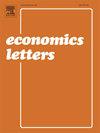欧元区的银行贷款标准和货币传导
IF 2.1
4区 经济学
Q2 ECONOMICS
引用次数: 0
摘要
本文使用FAVAR模型和来自欧洲央行银行贷款调查的调查数据,分析了银行在欧元区货币政策冲击传导中的作用。我们发现,银行对紧缩政策冲击的主要反应是收紧贷款标准,而不是调整贷款利率。与市场收益率相比,贷款标准的反应更为异质,而各国感知到的贷款需求差异更大。这些发现突出了信贷供给和需求在货币政策异质性传导中的重要性。本文章由计算机程序翻译,如有差异,请以英文原文为准。
Bank lending standards and monetary transmission in the euro area
This paper analyzes the role of banks in the transmission of monetary policy shocks in the euro area using a FAVAR model and survey data from the ECB’s Bank Lending Survey. We find that banks primarily respond to a contractionary policy shock by tightening lending standards rather than adjusting lending rates. Lending standards react more heterogeneously than market yields, while perceived loan demand varies even more across countries. These findings highlight the importance of both credit supply and demand in the heterogeneous transmission of monetary policy.
求助全文
通过发布文献求助,成功后即可免费获取论文全文。
去求助
来源期刊

Economics Letters
ECONOMICS-
CiteScore
3.20
自引率
5.00%
发文量
348
审稿时长
30 days
期刊介绍:
Many economists today are concerned by the proliferation of journals and the concomitant labyrinth of research to be conquered in order to reach the specific information they require. To combat this tendency, Economics Letters has been conceived and designed outside the realm of the traditional economics journal. As a Letters Journal, it consists of concise communications (letters) that provide a means of rapid and efficient dissemination of new results, models and methods in all fields of economic research.
 求助内容:
求助内容: 应助结果提醒方式:
应助结果提醒方式:


